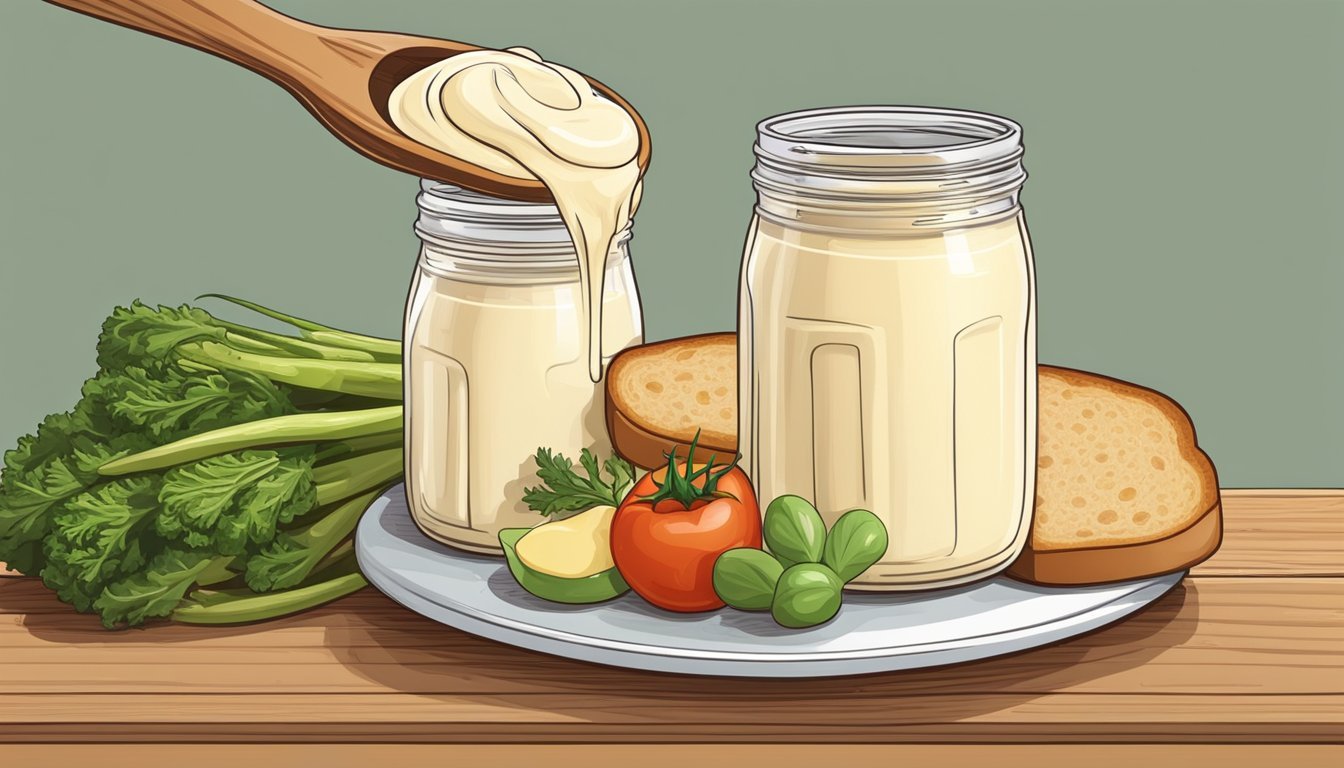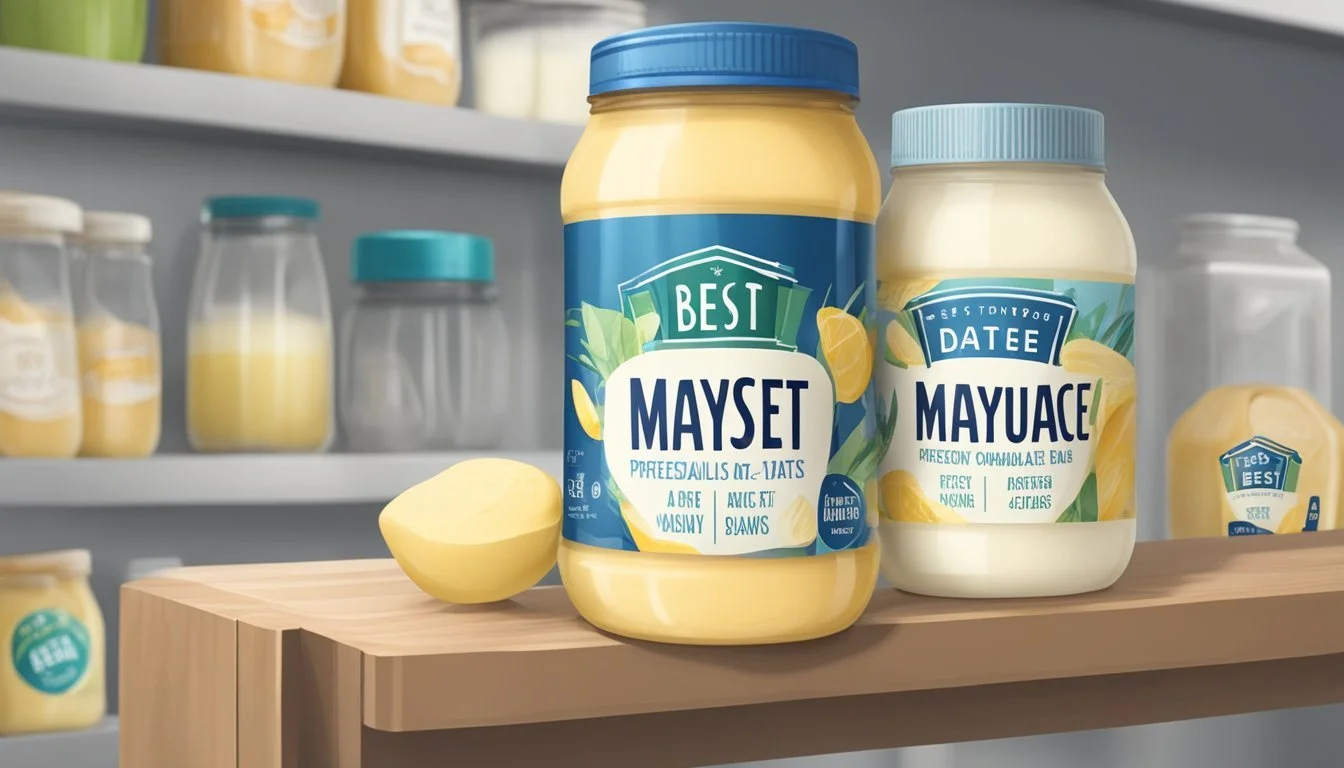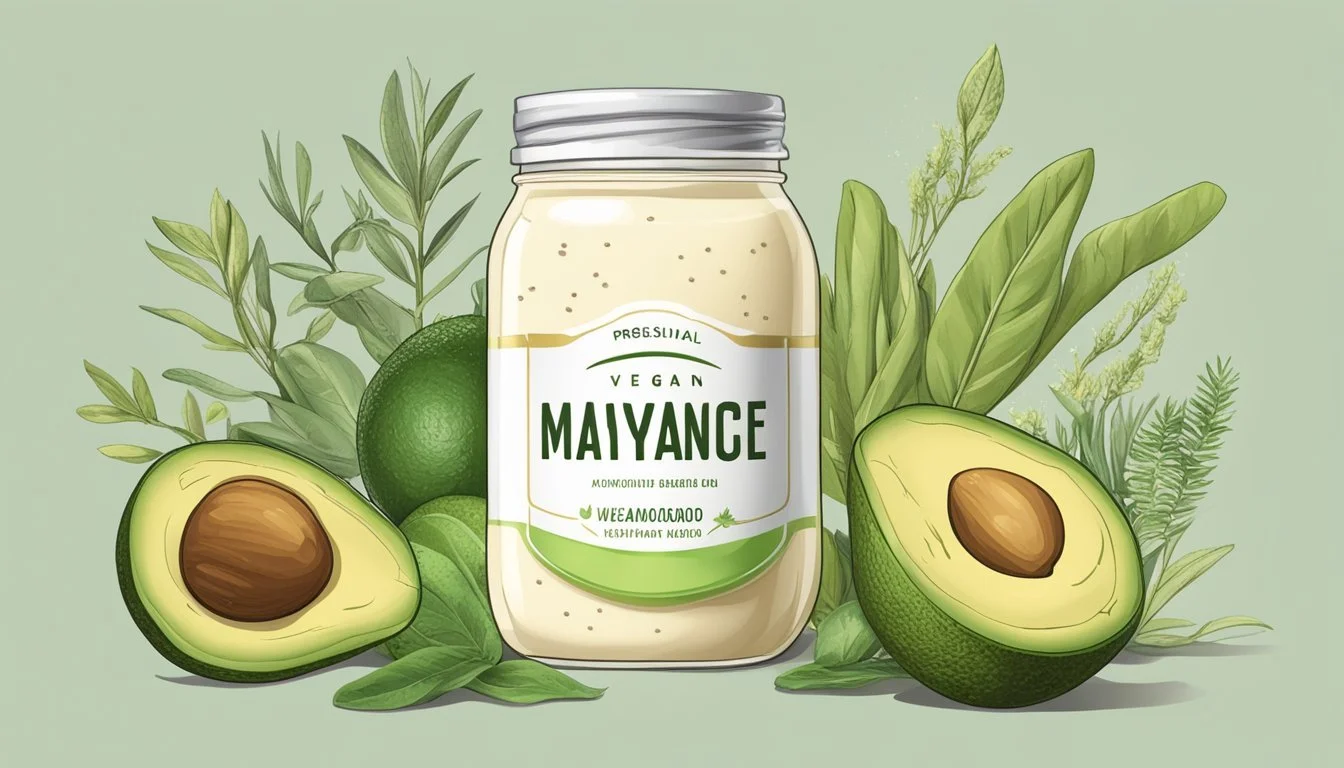Is Mayonnaise Vegan?
Unveiling the Truth About This Condiment
Traditional mayonnaise is not vegan, as it contains egg yolks. Eggs are a key ingredient in conventional mayonnaise, serving as an emulsifier that binds oil and vinegar or lemon juice together to create a creamy condiment. Since vegans avoid all animal products, standard mayonnaise made with eggs does not fit into a vegan diet.
However, the growing demand for plant-based alternatives has led to the creation of vegan mayonnaise varieties. These vegan versions replace egg with alternative emulsifying agents such as soy milk, aquafaba (the liquid from cooking beans), or modified food starches. Oils commonly used in vegan mayonnaise can include avocado, canola, or olive. This allows those following a vegan lifestyle to enjoy a product similar in taste and texture to traditional mayonnaise without using any animal-derived ingredients.
Defining Vegan Mayo
Vegan mayonnaise, commonly referred to as vegan mayo, is a plant-based alternative designed to mimic the creamy texture and flavor of traditional mayonnaise without the use of animal-derived ingredients.
Key Ingredients
Base: Vegan mayo typically uses ingredients like aquafaba (the liquid from canned chickpeas), silken tofu, or soaked cashews as an egg-free base for creaminess.
Oil: A variety of oils such as avocado, canola, or olive oil are employed to maintain the richness found in regular mayo.
Acid: Ingredients like vinegar or lemon juice are included to give vegan mayo the characteristic tangy flavor.
Seasonings: A dash of salt, and sometimes mustard or garlic, are used to enhance taste.
Differences From Traditional Mayo
Traditional mayonnaise is primarily made from egg yolks and oil, with some acidifiers like vinegar or lemon juice. Vegan mayo differs notably in two aspects:
Egg Substitutes: Vegan mayo uses plant-based ingredients instead of eggs. The most common substitutes are items like aquafaba which provides the emulsifying properties needed for the spread's texture.
Fat Content: While both mayonnaises have similar fat content due to the use of oils, vegan mayo might offer varying types of fatty acids because of the different plant-based oils used, which can influence both health aspects and flavor profiles.
Health Aspects
When considering the health aspects of mayonnaise, it's important to compare the nutritional content of traditional and vegan varieties and to understand the benefits of the plant-based ingredients commonly used in vegan mayo.
Nutritional Comparison
Nutrient Traditional Mayo Vegan Mayo Calories Higher Lower Protein Lower Higher Saturated Fat Higher Lower Fiber None Varies Iron Lower Varies Sodium Similar Similar Cholesterol Present None
The table above provides a snapshot of how traditional mayonnaise compares to vegan mayonnaise in terms of key nutritional factors. Vegan mayo often contains fewer calories and less saturated fat, while providing more protein compared to its non-vegan counterpart. Additionally, traditional mayonnaise contains cholesterol, whereas vegan mayo is cholesterol-free. Both may have similar sodium levels, but the fiber and iron content can vary among vegan mayo brands due to the diversity of plant-based ingredients used.
Benefits of Plant-Based Ingredients
Vegan mayonnaise usually incorporates a variety of plant-based oils such as canola, soybean, or sunflower oil. These oils contribute to a lower saturated fat content, which is associated with better heart health. The absence of animal-derived ingredients means vegan mayo is naturally cholesterol-free, a positive factor in a heart-healthy diet. In some cases, additional ingredients in vegan mayo provide minor amounts of fiber and iron, nutrients that offer their own health benefits. Considering that vegan mayo can be part of a diet that aims to reduce the intake of saturated fats and cholesterol, alongside ethical and environmental motivations, it represents a healthier alternative for individuals looking to make dietary changes in line with these values.
Making Vegan Mayo at Home
Creating vegan mayonnaise at home is a straightforward process that requires simple kitchen equipment, a few basic ingredients, and a methodical approach. Here's how one can craft a creamy and satisfying vegan mayo right in their own kitchen.
Basic Equipment
To make homemade vegan mayonnaise, one needs an immersion blender, a food processor, or a standard blender. The immersion blender is particularly effective, as it helps to create a stable emulsion quickly and efficiently. The equipment should be used in a tall container to allow for proper mixing.
Recipe Steps
Combine the base liquid (soy milk or aquafaba) with seasonings such as mustard, salt, and either vinegar or lemon juice in the blender jar.
Begin blending the ingredients, then slowly drizzle in a neutral-flavored oil while the machine runs to emulsify the mixture.
Continue to blend until the mayo reaches the desired thickness and creaminess, which should take only a few minutes.
Ingredient Substitutions
Aquafaba, the liquid from canned chickpeas, can be used as an egg substitute to lend the mayo its characteristic texture.
In place of vinegar, one may opt for lemon juice to add a fresh tanginess to the mayo.
For the oil component, consider a neutral vegetable oil, or olive oil for a richer flavor, though the latter may overpower other tastes in the mayo.
Mustard is a key ingredient for emulsification and flavor but can be adjusted to taste or substituted with other spices as needed.
Texture and Taste
When discussing vegan mayonnaise, texture and taste are defining characteristics that are carefully considered by manufacturers to mimic the familiar qualities of traditional mayonnaise. The crux of the challenge lies in achieving the classic thick and creamy consistency without the use of eggs, while also ensuring that the flavor profile remains rich and satisfying.
Achieving Creaminess
The creamy texture of traditional mayonnaise is typically a result of emulsification, a process where egg yolk is blended with oil and acid to create a stable mixture. In vegan mayonnaise, plant-based ingredients are used to replicate this emulsification. A common base for vegan mayo is soy milk, which contains lecithin, a natural emulsifier. When combined with oils such as neutral vegetable oil or olive oil, and then blended, a thick and creamy texture is achieved. Silken tofu and cashews are also utilized for their creamy properties when blended smoothly.
Ingredients for emulsification:
Soy milk
Neutral vegetable oil
Olive oil
Silken tofu
Cashews
Flavor Enhancements
Flavor in mayonnaise comes from the careful balance of acid, salt, and sometimes a sweet element. Vegan mayonnaise often incorporates lemon juice or apple cider vinegar to add a fresh and tangy flavor that can closely resemble the acid component in regular mayonnaise. Dijon mustard is another ingredient that not only contributes to the emulsification process but also adds a depth of flavor. To achieve the desired taste, salt is added, and in some cases, a sweetener like sugar is used to round out the flavor profile, providing a hint of sweetness.
Key flavor ingredients:
Acid: Lemon juice, Apple cider vinegar
Salt
Sweetener: Sugar, other sweeteners
Depth: Dijon mustard
These carefully selected ingredients and methods ensure that the final product has a rich and thick texture, combined with a balanced taste that appeals to both vegan and non-vegan consumers alike.
Commercial Vegan Mayo Brands
With a growing number of consumers seeking plant-based alternatives, the market for vegan mayonnaise has expanded significantly. Several brands now offer vegan mayo that is not only free from animal-derived ingredients but also caters to gluten-free and dairy-free dietary needs.
Popular Brands
Primal Kitchen: Offers mayos that focus on whole food ingredients for healthier options, ranging between 50 to 90 calories per tablespoon.
O'dang Foods Egg-Free Mayo: Known for its flavorful vegan mayo options, ideal for plant-based sandwiches and salads.
Just Mayo: Once a leading brand in the vegan mayo market, it has been discontinued as the company shifted focus to their Just Egg product line.
Note on Availability: These products can typically be found at major grocery retailers including Safeway, Kroger, Whole Foods, and Walmart as well as natural food stores.
Label Reading Tips
When selecting a vegan mayonnaise, it is important for consumers to read labels carefully to ensure the product meets their dietary requirements. Here are some specifics to look for:
Ingredient List: Check for non-vegan ingredients such as eggs or dairy. Vegan mayos should only contain plant-based ingredients.
Nutritional Information: Look at the sodium and carbohydrate content to ensure they fit into your dietary needs, especially if you're monitoring intake for health reasons.
Allergen Statements: For those with gluten sensitivities, check for a "gluten-free" label to ensure the product does not contain wheat or gluten-containing ingredients.
Certifications: Look for certifications such as "Certified Vegan" which can provide an extra level of assurance.
Versatility in Recipes
Mayonnaise serves as a dynamic ingredient adaptable to a myriad of culinary applications, from enhancing the flavors of salads to forming the creamy base of spreads and dips.
Dressing and Sauces
In the realm of dressings and sauces, both traditional and vegan mayonnaise can be tailored to complement a variety of dishes. For example, a vegan aioli can be whisked together by simply substituting plant-based mayonnaise in a classic aioli recipe, offering a creamy texture and rich flavor that pairs well with sandwiches, potatoes, and as a condiment for grilled vegetables. Vegan mayonnaise also forms the foundation for tartar sauce, perfect for serving with meat substitutes or vegetable fritters.
When it comes to ranch dressing or other salad dressings, vegan mayo can be used in place of its traditional counterpart to achieve the desired creamy consistency, often seasoned with herbs and spices. It’s ideal for dressing green salads or as a topping for vegan-friendly coleslaw.
Salad Dressings: Vegan mayonnaise is integral in creating dairy-free dressings, like a vegan version of ranch dressing, which is a flavorful addition to any salad.
Aioli and Tartar Sauce: A simple swap to vegan mayo allows these sauces to maintain their classic taste while being suitable for vegan diets.
Spreads and Dips
Vegan mayonnaise excels as a base for spreads and dips due to its creamy texture and mild flavor, which can be easily seasoned or augmented with other ingredients. It can transform a simple sandwich by adding moisture and depth of flavor. When blended with avocado or herbs, it creates a rich spread that enhances wraps and burgers.
In the form of dips, such as those served with crudité or chips, vegan mayonnaise offers a satisfyingly smooth texture and is a healthier choice for those avoiding animal products. Dips like a dairy-free aioli or a pseudo ranch can be crafted for parties and gatherings, ensuring inclusivity for guests with different dietary preferences.
Sandwich Spreads: Vegan mayo can be mixed with various flavorings to create customized sandwich spreads.
Dips: As a dip base, vegan mayo is a versatile ingredient that performs well with mixed-in seasonings or mashed vegetables like beans for added texture and flavor.
Storage and Shelf Life
The shelf life of mayonnaise, whether vegan or traditional, is heavily influenced by storage conditions. Vegan mayonnaise typically requires careful handling to maintain freshness, whether it's a commercial product or homemade. The following subsections provide specific guidance on how to store vegan mayonnaise to ensure its optimal shelf life.
Refrigeration Requirements
Commercial Vegan Mayonnaise: It must be stored in the refrigerator after opening, where it can remain fresh for 2 to 3 months. Keep commercial vegan mayo at a consistent temperature within the refrigerator, preferably between 35°F to 40°F (1.7°C to 4.4°C). Before opening, it can often be stored at room temperature in a cool, dark place for up to 6 to 12 months.
Homemade Vegan Mayonnaise: Due to the absence of preservatives, it should always be stored in an airtight container in the refrigerator. Homemade variants last significantly shorter, around 7 to 10 days.
Homemade vs Store-Bought
Homemade Vegan Mayo typically uses fresh ingredients without added preservatives, hence, has a considerably shorter shelf life. It's crucial to store it in the refrigerator immediately after preparation.
Storage: Refrigerator in an airtight container
Shelf Life: Approximately 7 to 10 days
Store-Bought Vegan Mayo often includes preservatives, which extend its lifespan. Manufacturers seal it in airtight packaging, allowing for longer shelf stability.
Storage before opening: Cool, dark place at room temperature
Storage after opening: Refrigerator
Shelf Life: 6 to 12 months unopened, 2 to 3 months after opening
Proper storage is essential to maintain the quality and safety of vegan mayonnaise, irrespective of it being homemade or commercially produced.
Environmental and Ethical Considerations
When examining mayonnaise from a vegan standpoint, it's essential to understand the environmental and ethical implications of plant-based alternatives compared to traditional mayonnaise, which typically contains eggs.
Impact of Plant-Based Products
Plant-based mayonnaise alternatives offer several environmental benefits. Since these products omit animal-derived ingredients, they contribute to a reduction in farming practices that heavily use resources such as water and land. Vegan mayonnaise often utilizes ingredients like soy or pea protein, oils, and vegetable gums—the production of which generally has a lower carbon footprint than egg-based counterparts.
Resource Efficiency: Plant-based ingredients tend to require less water and arable land.
Carbon Emissions: The manufacturing process for vegan mayonnaise typically results in lower greenhouse gas emissions.
Animal Welfare
The production of traditional mayonnaise involves eggs, which raises ethical concerns regarding animal welfare. The conditions in which egg-laying hens are kept can be crowded and restrictive—factors that are not in line with ensuring animal wellbeing. Conversely, vegan mayonnaise eliminates the use of eggs, thereby removing the direct impact on chickens.
Ethical Sourcing: Vegan mayonnaise is not associated with the ethical dilemmas of the egg industry.
Cruelty-Free: Choosing plant-based mayonnaise supports cruelty-free food choices, aligning with ethical vegan principles.
Consumer Information
When choosing vegan mayonnaise, consumers often consider availability, pricing, and the environmental impact of the ingredients. These factors can influence purchasing decisions towards more sustainable and accessible options.
Availability and Pricing
Vegan mayonnaise is widely available across a range of retailers, from health food stores to mainstream supermarkets. Prices can vary depending on the brand and ingredients used. Commonly, vegan mayo is made with vegetable oils, such as canola oil or sunflower oil, which are usually affordable and readily available. Other varieties include olive oil, known for its health benefits, or avocado oil, popular for its creamy texture. Here is a quick breakdown of where you might find these products:
Canola and Sunflower Oil-Based Mayo: Common in grocery stores.
Olive Oil-Based Mayo: Available at health food stores and online.
Avocado Oil-Based Mayo: Found at specialty stores and larger supermarkets.
Pricing is generally competitive with conventional mayonnaise, though some brands with premium oils like avocado may be priced slightly higher.
Making Eco-Friendly Choices
For the environmentally conscious consumer, the choice of oil in vegan mayonnaise can reflect a commitment to sustainability. Oils like organic canola or sunflower are neutral in flavor and often sourced from more sustainable farming practices. Consumers looking for an environmentally friendly option tend to gravitate towards brands that prioritize sustainable sourcing for their oils.
Choosing mayonnaises that use olive oil or avocado oil can also have eco-friendly benefits, as these oils are typically associated with a lower environmental impact when compared to animal-derived fats. They offer the additional advantage of providing healthier unsaturated fats. It's advisable for buyers to check product labels and brand commitments for information on sourcing and environmental impact.
Nutrition Tips and Variations
When crafting vegan mayonnaise, one has the opportunity to tailor it to specific dietary requirements or preferences. This section discusses how to adapt vegan mayonnaise recipes to be more allergy-friendly or lower in fat and sugar.
Allergy-Friendly Options
Allergy-conscious individuals can safely enjoy vegan mayo by selecting the right base ingredients. Traditional vegan mayo often uses soy milk as an emulsifier, but for those allergic to soy, unsweetened almond milk or rice milk can serve as suitable alternatives. To avoid potential allergens, careful reading of labels is essential—opt for products free from cross-contaminants.
Soy Free: Substitute soy milk with unsweetened almond milk or rice milk.
Nut Free: Choose oat milk or hemp milk instead of nut-based milks.
Low-Fat and Low-Sugar Variants
Creating a healthier version of vegan mayo is straightforward by adjusting ingredients. A low-fat variant can be prepared using silken tofu or soft cooked chickpeas as a base to curb oil content, preserving creaminess while reducing calories.
Substitute the sweeteners in the recipe with natural, low-glycemic index options like stevia, maple syrup, or brown rice syrup depending on one's sweetness preference. These substitutes cater to those monitoring their sugar intake while still providing a touch of flavor.
Low-Fat Base: Use silken tofu or cooked chickpeas.
Natural Sweeteners: Opt for stevia, maple syrup, or brown rice syrup.








